Cold Weather Preparedness
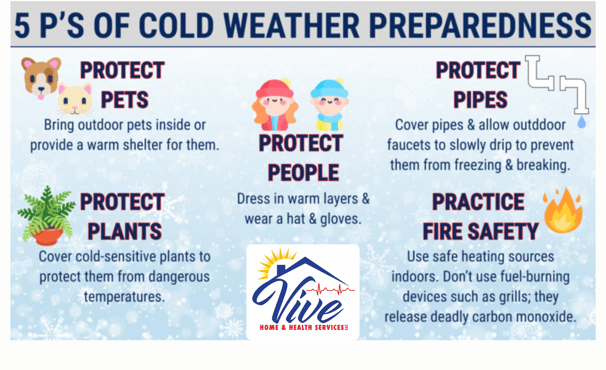

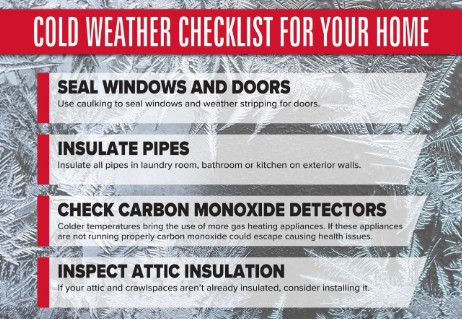

Before Freezing Weather
Seal gaps around windows and doors with weather stripping or caulk to keep the cold air out.
Inventory Disaster Supply Kit. Check expiration dates, replenish essential medications, charge devices, add blankets and cold-weather clothing, and have the right tools necessary to disconnect utilities if needed.
Review the communication plan. Communicate with your family and neighbors about their winter preparedness actions.
Test all smoke and carbon monoxide detectors.
Protect the “Five P’s”: People, pets, pipes, plants, and practice fire safety.
1. People:
Keep warm, stay inside if possible.
If you need to go out, dress in layers and wear hats, gloves, and an appropriate coat.
Avoid overexertion, as cold weather puts added strain on your body.
2. Pets:
Prolonged exposure to low temperatures and wind may be fatal to unprotected livestock and pets.
Bring pets inside and move other animals or livestock to sheltered areas.
Keep adequate food and water available.
3. Pipes:
Proper winterization of any exposed pipes/plumbing will be needed to prevent damage.
Disconnect outdoor hoses and drains, and store them in a protected area.
Wrap exposed faucets and pipes - including those outside the house or in unheated crawl spaces, attics, garages, and other areas.
If leaving out of town, shut off the main water supply and drainpipes to prevent damage should they burst.
4. Plants:
Bring potted plants inside or store them in a garage near an interior wall to provide extra warmth and protection from wind.
For cold-sensitive outdoor plants, put down extra mulch and consider covering them with a cloth fabric of some kind to shield the plants from wind and frost.
Tropical plants/vegetation will require maximum freeze protection.
5. Fire Safety:
Use safe heating sources indoor.
Don't use fuel burning devices such as grills; they release deadly carbon monoxide.
Vehicle Preparation: Service vehicle radiators and maintain antifreeze level; ensure tires are in good condition and have the correct air pressure. Store an emergency kit in your car including blankets, food and water, first aid, and other road safety items.
Stay updated on the latest weather forecast. Monitor local weather radio and television stations for information from local officials.
Before Winter Precipitation
Turn off and drain the water from outdoor water spigots. Disconnect and drain garden hoses and store them in a garage or shed. Learn how to shut off water valves for potential pipe bursts.
Protect the “Five P’s”: People, pets, pipes, plants, and practice fire safety.
Inventory your Disaster Supply Kit. Check expiration dates, replenish essential medications, charge devices, add blankets and cold-weather clothing, and have the right tools necessary to disconnect utilities if needed.
Review your communication plan. Communicate with your family and neighbors about their winter preparedness actions.
Service vehicle radiators and maintain antifreeze level; ensure tires are in good condition and have the correct air pressure. Store an emergency kit in your car including blankets, food and water, first aid, and other road safety items.
Stay updated on the latest weather forecast. Monitor local weather radio and television stations for information from local officials.
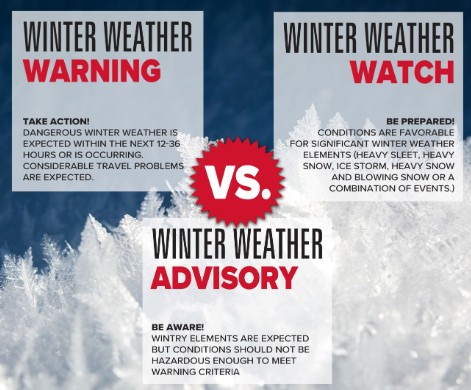

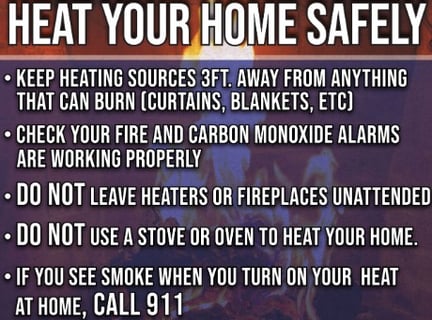

During Freezing Weather
Adjust your schedule to avoid being outside during the coldest temperatures, if possible.
Practice fire safety. Keep heating sources at least 3' away from any flammable materials. Always plug space heaters directly into an outlet, and make sure its cord isn’t damaged or frayed. Never use an oven or stove as a home heating source.
Wear several layers of loose clothing. Wear a hat and make sure to protect the ears, face, hands and feet.
If traveling outside, carry extra cold weather gear, such as extra socks, gloves, hats, jackets, blankets, a change of clothes, and a thermos of hot liquid.
Stay updated on the latest weather forecast. Monitor local weather radio and television stations for information from local officials.
During Winter Precipitation
Stay indoors as much as possible. Consider postponing non-essential travel to avoid slippery sidewalks and roadways. If travel is necessary, check local weather and traffic reports before heading out.
Winter storms may bring power outages. Follow the manufacturer’s instructions carefully when operating a generator, and only use it outdoors and away from windows. Disconnect appliances and electronics to avoid damage from electrical surges. Have alternate plans for refrigerating medicines or using power-dependent medical devices.
During a power outage, keep window coverings like blinds or curtains open during the day to take advantage of the sun’s heat. Close them at night to keep heat from escaping. Seal gaps around the windows with weather stripping or caulk to keep the cold air out.
Practice fire safety. Keep heating sources at least 3' away from any flammable materials. Always plug space heaters directly into an outlet, and make sure its cord isn’t damaged or frayed. Never use an oven or stove as a home heating source.
Stay updated on the latest weather forecast. Monitor local weather radio and television stations for information from local officials.
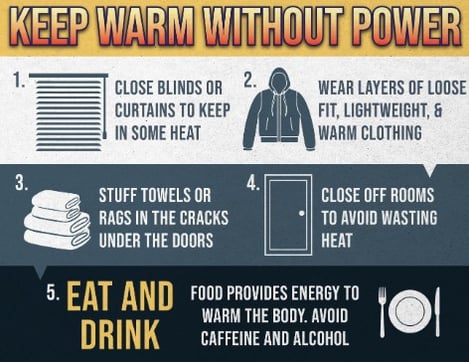

Exceptional home care to transform lives today.
COMMITMENT
INNOVATION
(956) 525-7555
© 2025. VIVE Home and Health Services LLC. All rights reserved.
EXCELLENCE
Call us at:
Fax us at:
(956) 525-7071
